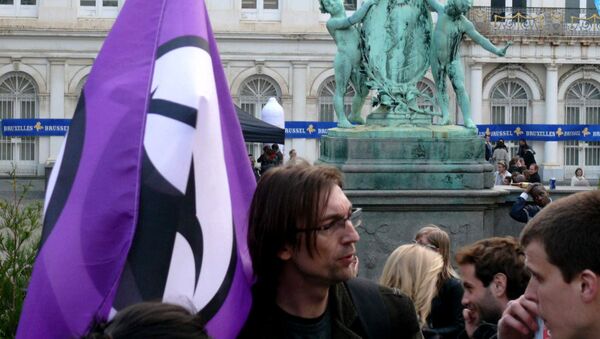The Pirate Party appeared less than four years ago as a fringe movement seeking to change copyright law, but now the organization has serious chances of being the frontrunner in the upcoming election.
"We've grown expansively in the last couple of years," Pirate Party candidate Oktavia Hrund told Radio Sputnik's Brian Becker, adding that the Pirate Party stands for, among other policies, is government transparency, advocating for privacy, and "updating laws to better fit the 21st century."
The Pirate Party has been riding a wave of anger against the establishment in a country that was hit especially hard by the 2008 global financial crisis. The party surged in support this year, after Prime Minister Sigmundur David Gunnlaugsson resigned in April following the release of the Panama Papers, linking him to an offshore company holding millions of dollars in debt from failed Icelandic banks.
"We refuse to collaborate with the current government parties because of…their involvement in corruption which came up very clearly in the Panama papers," Hrund said. "In certain ways, we could definitely be viewed as anti-establishment."
According to Hrund, the party, which seeks to grant citizenship to the US whistleblower Edward Snowden, does not take direct money from lobbies, and if a person or company wishes to donate, it is required to do so through a crowdsourcing platform.
The Pirate Party promises direct democracy and wants the constitution that the Icelandic people voted on in 2012 to come into effect.
José Tirado, a Puerto Rican poet and political writer living in Iceland, said during the Loud & Clear broadcast that he doubted that the approaching election would change the existing economic situation in a small "country of cousins," where certain families have traditionally owned certain resources. However, Tirado admitted that the Pirate Party has become the voice of a disenfranchised population that suffered in the crisis.
"This widespread dissatisfaction is revolutionary in potential," he said. "If in fact the Pirates pick the majority on Saturday, which I think is going be the case, and if they can push through with an alliance of the four-three other parties…and if they push through this constitution, there will be changes, but they will be long in coming."
Hrund said she was more optimistic, and that she was seeing a lot of courage in the country to "actually change the status quo."
In a Morgunbladid poll published Friday the Pirate Party won 21 percent of the votes. The Independence Party, currently the junior partner in the governing coalition, polled 22.5 percent. Senior partner, the Progressive Party, polled just 10 percent.



